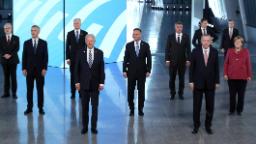Analysis: Biden pushes China threat at G7 and NATO, but European leaders tread carefully


China is nothing short of a foreign policy fixation in Washington. So it doesn’t take a genius to know what Biden may want in return for patching up the trans-Atlantic wounds of the Trump era. He said he “walked away” from the G7 summit in the UK convinced that the group recognizes that Beijing is part of a growing threat to global democracy. The summit agreed to set up an alternative to China’s Belt and Road infrastructure initiative. Reflecting US goals, it called on China to respect human rights in Hong Kong and Xinjiang province, and to permit a full probe into the origins of Covid-19. It also called for calm in the South and East China seas.
China was also on everyone’s lips at the subsequent NATO summit, and made an appearance in the alliance’s final joint statement for the first time. Secretary General Jens Stoltenberg, who runs an alliance meant to worry about Atlantic rather than Pacific security, warned Monday that China “is coming closer to us” in military prowess. And he pointed out that the communist giant doesn’t share the Western values NATO was set up to defend.
But the Europeans are also still squeamish about getting dragged by the US into a showdown. US officials said Italy and Germany were uneasy with potential communique language that China might view as provocative. Stressing “balance,” German Chancellor Angela Merkel said that “China is our rival in many questions but also our partner in many aspects.” Emmanuel Macron said the G7 wanted to work with Beijing on climate, trade, development and other issues despite disagreements. “I will be very clear: The G7 is not a club hostile to China,” the French President said.
Not surprisingly, none of this has gone down well in Beijing, where officials are hinting that widening divides on how Europeans and Americans will view China’s footprint could be a key goal of Beijing’s diplomacy. As for not provoking China, that ship has sailed. The Chinese Embassy in the UK chargedthat the G7 communique “deliberately slanders” Beijing and slammed the “sinister intentions of a few countries such as the United States.”








